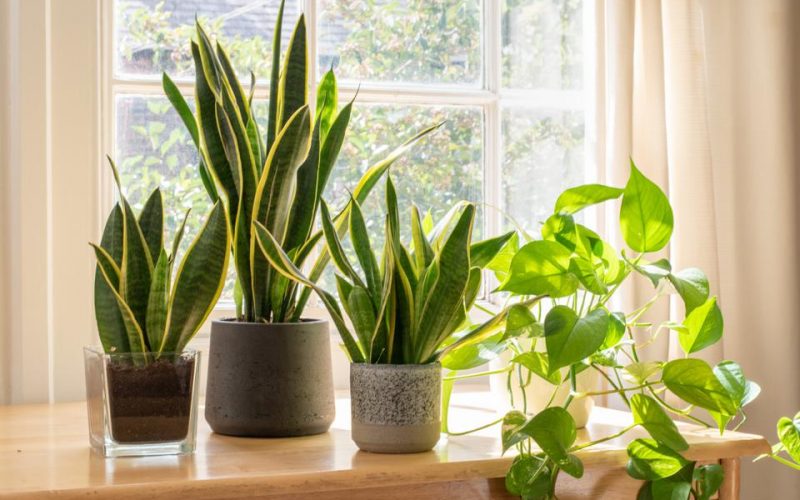Indoor plants have provided a wealth of health advantages and wellness enhancements that aim to foster a greener lifestyle and healthy, joyful vibes indoors if the thought of living décor wasn’t enough to entice you.
Indoor plants absorb CO2 and keep oxygen flowing, and they purify the air by removing toxins. They help to prevent illness, relieve tension and lower stress. They help you focus better by improving concentration levels, heightened attention, enhanced creativity, increased productivity, and improved overall well-being.
Indoor plants’ air-purifying and filtering properties help to create a healthier and happier working and living environment.
- Indoor plants may aid with stress reduction.
Plants around you might help you feel more relaxed, soothed, and natural, according to a study published in the Journal of Physiological Anthropology. A view of the city park might boost job happiness, but you might be surprised to learn that a potted plant can do the same thing. Typically, scientific evidence for phytoremediation — plants that cleanse toxins from the air — starts with NASA research from the 1980s.
If you finalise to buy houseplants to refresh the air organically, these are a few of the kinds that are the most beneficial by Trusted Source:
- Ficus tree
- Rubber tree
- Areca, lady, Dwarf date, and Bamboo palms
- Spider plant
- Boston fern
- Plants may help you work more efficiently.
A bromeliad could be the most helpful coworker you’ve ever had. Plants in the workplace have been shown to boost productivity and creativity in multiple studies.
It may seem unlikely that greenery can positively impact such an essential yet vital aspect of our life as our daily routines, yet the outcomes and smiles speak for themselves.
Witness the excitement that a living tree, such as a giant Bamboo Palm, offers to coworkers entering a reception area where it resides, or the tranquil slumber that a Snake Plant, Peace Lily, or Spider Plant may help cultivate in a bedroom.
The advantages of indoor plants are critical for the quality of the interior environment.
Toxins that commonly afflict our indoor environments include:
Tissues, serviettes, wood items, and synthetic materials all contain formaldehyde.
Trichloroethylene (TCE) is a chemical that is often found in paints, varnishes, and household cleansers.
Adhesives, lubricants, car exhaust, and detergents all contain benzene.
Ammonia is a gas that is typically found in cleaning supplies and fertilisers.
Xylene is a chemical that can be found in nail polish, tobacco smoke, and paint.
As a result, we can see how asthma and allergies, caused by common pollutants, are problems many people face.
The addition of a single or a few house plants can assist in reducing these common difficulties. Not to mention the decrease in stress and boost in productivity that the cleaner air and increased oxygen levels bring.
Indoor Plants with Health Benefits:
Spider Plant/Hen and Chickens – Chlorophytum
The Spider Plant is one of the most simple indoor plants to care for, producing oxygen while cleaning the air in your home or office by absorbing carbon monoxide, formaldehyde, and xylene. Order indoor plants online and add freshness and beauty to your living space.
Sansevieria (Snake Plant/Mother-in-Tongue) Law’s
Because it can absorb high levels of carbon monoxide, the Snake Plant cleans the air better than most other indoor plants.
It also emits oxygen and filters contaminants such as benzene, xylene, trichloroethylene, and dioxin from the air.
Spathiphyllum (Peace Lily)
Peace Lilies filter the air by absorbing airborne contaminants such as trichloroethylene, ammonia, benzene, formaldehyde, and xylene as one of the few flowering indoor plants.
These indoor beauties not only provide oxygen and reduce pollutants, but they also aid to eliminate mould. Send Peace Lily online to your grandparents and help them live a healthy life.
Hedera Helix – English Ivy
English Ivy has incredible air-filtering properties that are especially beneficial to people who have asthma, breathing issues, or allergies.
They can also absorb animal faeces, benzene, carbon monoxide, and formaldehyde and minimise air moulds.
Aloe Vera
Aloe Vera gel contains therapeutic qualities that aid in the healing of injuries and burns. Aloe Vera also produces oxygen and acts as an air pollutant filter, particularly for toxins generated by cleaning agents.
Aglaonema – Chinese Evergreen
Aglaonema cleans and purifies indoor air by absorbing formaldehyde, carbon monoxide, and benzene, making it one of the most user-friendly indoor plants.
Chrysalidocarpus Lutescens (Bamboo Palm)
The wonderfully structured Bamboo Palm, like the Sword Fern, functions as a natural humidifier and helps clean and filter indoor air by absorbing formaldehyde and xylene. Order Bamboo plants online and add years to your life.
Each plant has its cleansing properties and contributes to creating a healthier environment in its manner. Using various indoor plants and grouping them has been shown to produce the best visual appeal and plant survival results.
As a result, you should embrace the jungle vibe and allow the various plants to collaborate to create the healthiest environment possible. It’s critical to know which plants are poisonous if you have pets or children. If you have asthma or allergies, be aware of species that irritate them.
Sharing your working or living space with living, breathing plants can make your environment a more pleasant and healthy place to be.





